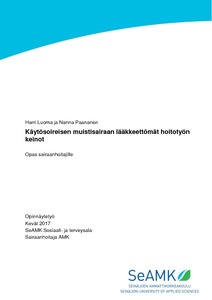| dc.contributor.author | Luoma, Harri | |
| dc.contributor.author | Paananen, Nanna | |
| dc.date.accessioned | 2017-09-28T09:27:15Z | |
| dc.date.available | 2017-09-28T09:27:15Z | |
| dc.date.issued | 2017 | |
| dc.identifier.uri | URN:NBN:fi:amk-2017092715452 | |
| dc.identifier.uri | http://www.theseus.fi/handle/10024/133856 | |
| dc.description.abstract | Aiheena opinnäytetyölle oli Käytösoireisen muistisairaan lääkkeettömät hoitotyön keinot – opas sairaanhoitajille. Opinnäytetyön tavoitteena oli tuottaa tietoa muistisairaan käytöshäiriöiden syistä ja lisäksi lisätä ymmärrystä sairaanhoitajille muistisairaan haasteellisen käytöksen lisääntymisestä. Opinnäytetyön tarkoituksena oli tuottaa yhteistyökumppanille opas, joka sisältää yleisimmät muistisairaudet ja niihin liittyvien käytöshäiriöiden ilmenemismuodot aiheuttajineen ja vaikuttavine tekijöineen. Tämän lisäksi opas sisältää hoitotyön keinoja, joiden avulla sairaanhoitaja pystyy havainnoimaan ja lieventämään muistisairaan käytösoireita. Opinnäytetyö on tehty yhteistyössä Suupohjan peruspalveluliikelaitoskuntayhtymän hoidon ja hoivan alueen kanssa.
Etenevien muistisairauksien diagnostiikkaan kuuluu käytösoireiden lisääntyminen. Käytösoireita on muistisairauksien kaikissa vaiheissa ja niiden ilmaantuminen voi johtaa liialliseen ja turhaan rauhoittavien lääkkeiden määräämiseen ja käyttöön, on kuitenkin hyvä huomioida kokonaisvaltainen hoito, joka on potilaan yksilöllisen tilanteen huomioon ottava. Muistisairaiden määrä kasvaa nopeasti, varhaisen diagnosoinnin avulla pystytään ylläpitämään sairastuneen toimintakykyä ja huomioimaan sairastuneen oman elämänlaadun pysyminen hyvänä, unohtamatta hänen läheisiään.
Käytösoireisen potilaan hoitolinja tulisi valita arvioimalla oireita ja selvittämällä niiden syy. Lääkkeettömän hoidon tarkoitus on, että muistisairaasta huolehditaan kokonaisvaltaisesti ja mahdollisimman hyvin hänen tarpeensa huomioon ottaen. Sairastuneen toimintakyvyn tukeminen on tärkeää, silloin hän tuntee olonsa turvatuksi ja arvostetuksi. Hyvien elämäntapojen huomioiminen, riittävän unen ja aktiviteetin turvaaminen tukevat sairastuneen tasapainon tunnetta. Käytöshäiriöiden syntyyn vaikuttaa myös ympäristössä tapahtuvat muutokset. Sairaanhoitajan on tärkeä luoda sairastuneelle tässä tilanteessa rauhallinen ja turvattu ympäristö. | fi |
| dc.description.abstract | The subject for the thesis is non-drug nursing methods of a patient with memory disease and behavioural disorder. The aim of the thesis was to provide information on the causes of behavioural disorders of a patient with memory disease, and in addition, to increase nurses’ understanding about the negative behaviour of memory patients. The purpose of the thesis was to produce a guide containing the most common memory disorders and related manifestations of behavioural disorders, with their causes and contributing factors. In addition, the guide includes nursing tools that help the nurse to observe and mitigate the behavioural disorders of a patient with a memory disease. The thesis has been carried out in cooperation with the treatment and care area of The Suupohja Area Health and Social Services Joint Municipal Board.
The diagnostics for progressive memory diseases include an increase in behavioural disorders. There are behavioural disorders at all stages of memory disorders, and their appearance may lead to the prescription and use of excessive and unnecessary medication. However, it is good to take into account the holistic treatment that is appropriate to the patient's individual condition. The number of patients with memory disease is increasing rapidly. With early diagnosis, it is pos-sible to maintain patients’ functional ability and take account of their quality of life, not forgetting their close relatives.
The treatment line for the patient with behavioural disorder should be selected by evaluating the symptoms and finding out their cause. The purpose of non-drug nursing is that the patient with memory disorder is taken care of comprehensively, and his or her needs are taken into account as well as possible. Supporting the functional ability of the patient is important, and he or she feels secure and appreciated. Paying attention to a good lifestyle, ensuring adequate sleep and activity support the balance feeling of the patient. Changes in the environment also affect the appearance of behavioural disorders. It is important for the nurse to create a calm and secure environment for the patient in this situation. | en |
| dc.language.iso | fin | |
| dc.publisher | Seinäjoen ammattikorkeakoulu | |
| dc.rights | All rights reserved | |
| dc.title | Käytösoireisen muistisairaan lääkkeettömät hoitotyön keinot : Opas sairaanhoitajille | fi |
| dc.type.ontasot | fi=AMK-opinnäytetyö|sv=YH-examensarbete|en=Bachelor's thesis| | |
| dc.identifier.dscollection | 10024/126 | |
| dc.organization | Seinäjoen ammattikorkeakoulu | |
| dc.contributor.organization | Seinäjoen ammattikorkeakoulu | |
| dc.subject.keyword | muistisairaus | |
| dc.subject.keyword | ikääntyneet | |
| dc.subject.keyword | dementia | |
| dc.subject.keyword | käytösoireet | |
| dc.subject.keyword | lääkkeetön hoito | |
| dc.subject.keyword | vanhustyö | |
| dc.subject.keyword | hoitotyö | |
| dc.subject.degreeprogram | fi=Hoitotyö|sv=Vård|en=Nursing| | |
| dc.subject.discipline | Hoitotyö | |
